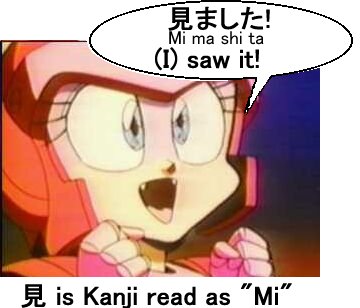Lesson 8: "I came, I saw, I ate"
Of course, verbs are an important part of any language. Verbs show what is happening. Japanese verbs might seem a bit confusing to you at first, but it will be easier for you to learn them than it would be for a non-english speaking person to learn English verbs. For example, the English verb "go"; You have "Going" for the present, "Will go" for the future, and "went" or "Did go" for the past. Imagine how confusing it must be for a non-English speaker to figure out how "went" got mixed in to this. It doesn't have "go" in it at all! In Japanese, "Go" is "Ikimasu" (ee-kee-mas), "Going" is also "Ikimas'"*, and to make the past tense, "Went", just change the ending to get "Ikimashita". That's the way Japanese verbs work; the same beginning with different endings to change the meanings. The good news is, these endings are pretty much the same for all the Japanese verbs. The "-shita" ending will change any other verbs it's used with to a past tense version of that word. So I can use it to change "Eat", "Tabemasu" (tah-beh-mas) to "Have eaten", "Tabemashita". A verb can be changed to a negative by using the "-sen" ending. So, "Tabemas'" is changed to "Tabemasen"="Didn't eat". But that's not all, there are more verb endings to get more meanings. To invite someone to do something, you use "-sho", like "Ikimasho" = "Lets go". This may seem like a lot to learn, but the great thing is, once you learn these verb "modifiers", they work with about every Japanese verb you'll need. Then, once you learn a new verb, like "Mimasu" (See), you'll already know "Mimashita" (Saw), "Mimasen" (Didn't see) and "Mimasho" (Let's see). So, if I give you the verbs "Kimasu" (Kee-mas) "comes", "hanashimasu" (ha-nah-shee-mas) "talks/speaks", and "Nomimasu" (No-mee-mas) "drinks", you'll be able to give the past tense (-shita), negative tense (-sen), and an invitation (-sho). So des' ka?
Then, once you learn a new verb, like "Mimasu" (See), you'll already know "Mimashita" (Saw), "Mimasen" (Didn't see) and "Mimasho" (Let's see). So, if I give you the verbs "Kimasu" (Kee-mas) "comes", "hanashimasu" (ha-nah-shee-mas) "talks/speaks", and "Nomimasu" (No-mee-mas) "drinks", you'll be able to give the past tense (-shita), negative tense (-sen), and an invitation (-sho). So des' ka?
Watashi wa ikimas'. = I go (am going).
Watashi wa ikimasen. = I don't go (are not going).
Ikimasho ka? = Shall we go?
Hai, ikimasho! = Yes, lets go!
Pururun-san wa kimashita ka? = Miss. Pururun came?
Anata wa hanashimashita. = You were speaking."
Nomimasho. = Lets drink.
Biiru nomimasen. = (I) don't drink beer.
O-cha nomimas'. = (I) drink tea.
 Adding "-shita" makes a verb past tense, and adding "-sen" makes it a negative, but what if you want to do both at the same time? Like to say "Did not go". For that, you'll need an extra word. First, use the negative ending for the verb, in this case "Ikimasen" = "doesn't go", then add "Deshita" (deh-shee-tah) to make it past tense. "Deshita" is sort of like "Des'" with the negative "-shita" added to it. It works like "Des'" but shows past tense instead of present tense. So, to say "I didn't go" you'd say "Watashi wa ikimasen deshita" or just "Ikimasen deshita" = "Didn't go"
Adding "-shita" makes a verb past tense, and adding "-sen" makes it a negative, but what if you want to do both at the same time? Like to say "Did not go". For that, you'll need an extra word. First, use the negative ending for the verb, in this case "Ikimasen" = "doesn't go", then add "Deshita" (deh-shee-tah) to make it past tense. "Deshita" is sort of like "Des'" with the negative "-shita" added to it. It works like "Des'" but shows past tense instead of present tense. So, to say "I didn't go" you'd say "Watashi wa ikimasen deshita" or just "Ikimasen deshita" = "Didn't go"
Pururun-san wa ikimashita ka? = Miss. Pururun went?
Iie, Pururun-san ga ikimasen deshita. = No, Miss. Pururun did not go.
Hai, Sukashii-san ga ikimashita. = Yes, Mr. Sukashii went (did go).
Pururun-san ga doko ikimashita ka? = Where did Miss. Pururun go?
Mimasen deshita = (I) didn't see.
Piza wa tabemashita ka? = Did you eat the pizza?
Mo tabemashita. = Already have eaten.
Mada tabemasen. = Haven't yet eaten.
Study, and don't hesitate to go back over the previous lessons if you can use a refresher.
*Remember, that silent "U" when dealing with Japanese words that end with the "su". "Masu" and "Desu" sound more like "Mas" and "Des".
 Adding "-shita" makes a verb past tense, and adding "-sen" makes it a negative, but what if you want to do both at the same time? Like to say "Did not go". For that, you'll need an extra word. First, use the negative ending for the verb, in this case "Ikimasen" = "doesn't go", then add "Deshita" (deh-shee-tah) to make it past tense. "Deshita" is sort of like "Des'" with the negative "-shita" added to it. It works like "Des'" but shows past tense instead of present tense. So, to say "I didn't go" you'd say "Watashi wa ikimasen deshita" or just "Ikimasen deshita" = "Didn't go"
Adding "-shita" makes a verb past tense, and adding "-sen" makes it a negative, but what if you want to do both at the same time? Like to say "Did not go". For that, you'll need an extra word. First, use the negative ending for the verb, in this case "Ikimasen" = "doesn't go", then add "Deshita" (deh-shee-tah) to make it past tense. "Deshita" is sort of like "Des'" with the negative "-shita" added to it. It works like "Des'" but shows past tense instead of present tense. So, to say "I didn't go" you'd say "Watashi wa ikimasen deshita" or just "Ikimasen deshita" = "Didn't go" Then, once you learn a new verb, like "Mimasu" (See), you'll already know "Mimashita" (Saw), "Mimasen" (Didn't see) and "Mimasho" (Let's see). So, if I give you the verbs "Kimasu" (Kee-mas) "comes", "hanashimasu" (ha-nah-shee-mas) "talks/speaks", and "Nomimasu" (No-mee-mas) "drinks", you'll be able to give the past tense (-shita), negative tense (-sen), and an invitation (-sho). So des' ka?
Then, once you learn a new verb, like "Mimasu" (See), you'll already know "Mimashita" (Saw), "Mimasen" (Didn't see) and "Mimasho" (Let's see). So, if I give you the verbs "Kimasu" (Kee-mas) "comes", "hanashimasu" (ha-nah-shee-mas) "talks/speaks", and "Nomimasu" (No-mee-mas) "drinks", you'll be able to give the past tense (-shita), negative tense (-sen), and an invitation (-sho). So des' ka?